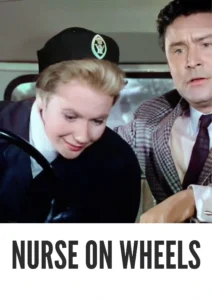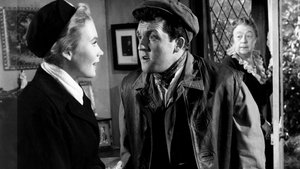Video Sources 0 Views
- Nurse on Wheels 1963 Colorized


Synopsis
Table of Contents
Toggle
Get ready for a heartwarming and hilarious journey with Nurse on Wheels, a delightful British comedy from 1963, now beautifully colorized to brighten your day. Directed by Gerald Thomas and starring Juliet Mills, this film brings to life the story of a young district nurse finding her place in a quirky rural community. Perfect for fans of classic British comedies and those seeking a feel-good movie, this HD download offers a fresh and vibrant take on a beloved classic. You might even know it as What a Carry On: Nurse on Wheels!
Nurse on Wheels tells the story of Joanna Jones (Juliet Mills), a newly qualified nurse who takes on her first job as a district nurse in a quaint rural village. Moving into a cottage with her mother, Joanna is eager to prove herself to the community.
However, she soon discovers that the villagers are resistant to change and prefer the older, recently retired Nurse Merrick. Despite the initial skepticism, Joanna’s determination and kindness eventually win over the hearts of her patients.
As she navigates the challenges of her new job, Joanna encounters a colorful cast of characters, including Henry Edwards, a rich but short-tempered farmer, and Dr. Golfrey, a charming doctor who catches her mother’s eye. When a young couple parks their caravan on Edwards’ land, Joanna finds herself at the center of a community dispute, leading to heartwarming moments and hilarious situations.
The film is a charming blend of lighthearted humor, heartwarming moments, and classic British wit, making it a delightful cinematic experience for audiences of all ages.
The film features a talented cast of actors who bring this heartwarming story to life:
-
Juliet Mills as Joanna Jones
-
Ronald Lewis as Henry Edwards
-
Joan Sims as Deborah Walcott
-
Noel Purcell as Abel Worthy
-
Esma Cannon as Mrs. Jones
-
Raymond Huntley as The Vicar
Nurse on Wheels is a classic British comedy that falls into the genre of feel-good movies. Its lighthearted humor and heartwarming story make it a perfect choice for a relaxing movie night.
Released in 1963, Nurse on Wheels reflects the popularity of British comedies during this era. These films often featured quirky characters, charming rural settings, and lighthearted storylines, providing audiences with an escape from the everyday. Nurse on Wheels stands as a delightful example of this trend, showcasing the talents of British actors and filmmakers in creating heartwarming and entertaining stories.
This colorized version of Nurse on Wheels has been meticulously restored using modern digital techniques, enhancing the visual appeal while preserving the film’s original charm and atmosphere. The colorization process involved carefully analyzing the grayscale tones of the original black and white footage and assigning appropriate colors to each scene. While the specific software used remains proprietary, the techniques employed included advanced algorithms for color palette selection and image enhancement. This painstaking process brings new life to the characters and settings, making the story even more engaging for modern audiences. While some may debate the merits of colorizing classic films, it introduces these films to a broader audience, ensuring their legacy for future generations.
-
: Gerald Thomas
-
: Norman Hudis, based on the novel “Nurse is my Neighbour” by John Burke
-
: Alan Hume
-
: Archie Ludski
-
: Peter Rogers Productions
-
: Anglo-Amalgamated Film Distributors
-
: 85 minutes
-
: MP4
-
: HD (1080p)
-
: Compatible with most devices, including smartphones, tablets, computers, and smart TVs.
Nurse on Wheels (1963) is remembered as a charming and heartwarming comedy that captures the spirit of rural British life. Its delightful story, memorable characters, and lighthearted humor have made it a beloved classic for audiences of all ages.
-
: What is Nurse on Wheels about?
-
A: Nurse on Wheels is a comedy about a young district nurse who finds her place in a quirky rural community.
-
-
: Is Nurse on Wheels (1963) a well-known film?
-
A: Nurse on Wheels is a beloved classic of British comedy, known for its charming story and memorable characters.
-
-
: Is this version of Nurse on Wheels colorized?
-
A: Yes, this version has been professionally colorized to enhance the viewing experience.
-
-
: What makes Nurse on Wheels interesting for classic film fans?
-
A: Nurse on Wheels offers a delightful glimpse into rural British life and showcases the talents of a stellar cast in a heartwarming and humorous story.
-
-
: What is the download format?
-
A: The download format is MP4, which is compatible with most devices.
-
-
: What resolution is the download?
-
A: The resolution is HD (1080p), providing a high-quality viewing experience.
-
Watch Nurse on Wheels Today!











